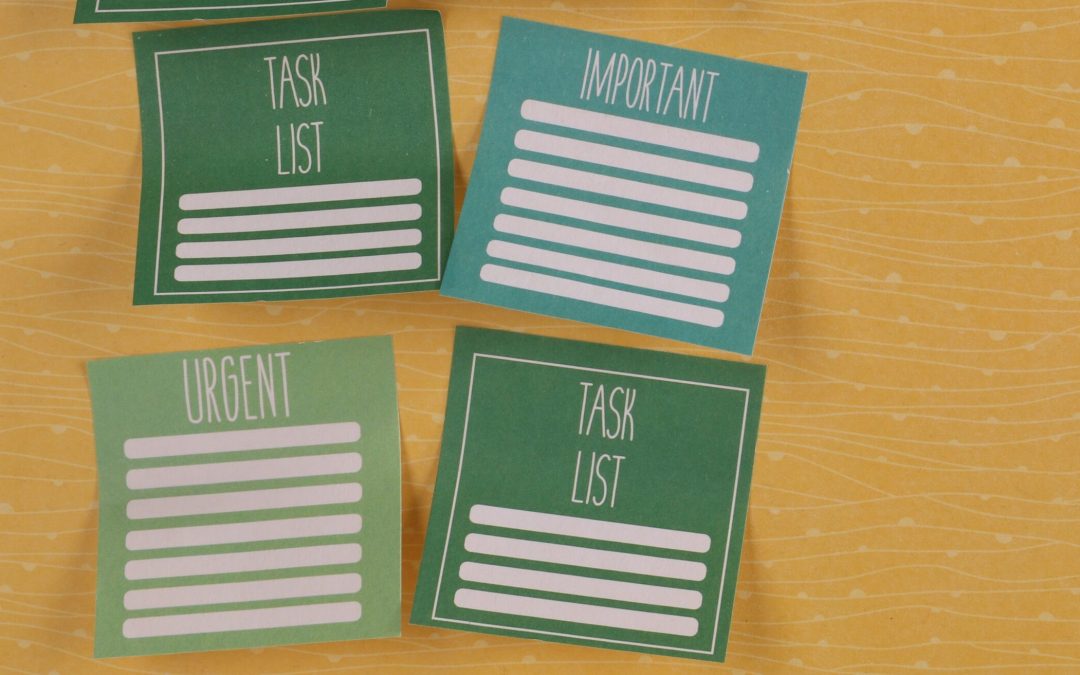
by Jenna | Jan 18, 2024 | ScriptMag Articles
In this month’s “Ask the Coach” article, I’m responding to a question from a reader about setting goals for the new year while also recovering from burnout.
Hi Jenna, it’s the start of the year, and I know it’s past time to sort out my writing goals for 2024, but I’m (still) recovering from burnout and I worry about pushing myself too far. I’m writing on spec, so I don’t have deadlines I have to meet, just a sense that I need to get work out into the world ASAP. What suggestions do you have for making the most of writing this year, while also continuing to recover. Thank you! ~ One Burned Out Writer
It’s no small task, and as someone who’s been in a similar situation, I know it takes as long as it takes. Many writers, creatives, and entrepreneurs around me seem to be experiencing similar circumstances. I’m seeing quite a few thought-leaders advising against pushing hard on the goal-setting front this year.
Whether your burnout is personal, writing-related, or because of the happenings of the broader world, taking the time you need to recover is critical to your ability to generate your best work. So do give the gift of recovery to yourself.
In my response, I discuss:
- trusting yourself and your intuition with goal setting
- focusing on what would feel good to you over deadlines and SMART goals
- focusing on the practices, habits, or rituals you’d like to have in place around your writing
- guiding your writing while recuperating by intuition rather than force
- allowing time for “sideways drift”
Thankfully, writing is not incompatible with recuperation. I would argue that writing is a critical part of how we heal and find ourselves again, if we have the patience and willingness to stay with it.
Want the full scoop? Get all the details in the full article on Script Mag:

by Jenna | Dec 18, 2021 | ScriptMag Articles
Welcome to the latest installment of my “Ask the Coach” column on Script Mag! This month I’m addressing a reader’s question about how much (or whether) to plan writing time:
“How much should I be planning my writing time vs. just showing up to write each day?”
Much like the answer to most writing-related questions, it depends.
Here are some things to think about:
1. Showing up to write consistently is one of the most consequential actions you can take as a writer.
Whether you plan or don’t plan, showing up to write consistently and regularly throughout the year is the best way to see your body of work building over time.
Writing regularly has other benefits as well: According to a study by researcher Robert Boice, writers who write daily are twice as likely to have frequent creative thoughts as writers who write when they “feel like it.”
Writing consistently is also the best way to “find” or develop your voice, something writers often ask about too.
I typically advise most writers to aim to write 5 to 7 days each week, leaning to daily for newer writers or writers getting back on track after time away. Longer gaps between writing sessions make it harder to restart.
On the other hand, “just writing” without any kind of plan won’t necessarily help you see a script (or other writing projects) through to Done. Yes, ideas and voice development, as well as personal growth and insight are valuable. But planned writing leads to completion. At the same time, you can design it in such a way as to allow for flexibility. [more…]
While you certainly can be detailed in your day’s planning, I recommend working within the context of a well-structured goal and overall plan and setting up daily average targets in terms of time, page counts, and/or to-do’s.
Photo by cottonbro from Pexels

by Jenna | Jan 3, 2021 | Writing Articles
This is the third and final article in our “new year to write” series! This article is about some of the lessons we learned in 2020 about writing all year round even in the most difficult and unexpected circumstances.
In our Called to Write community, it feels like we’ve been through it all together — it’s always an incredible place for learning and growing in a powerful way. 2020 really put our collective writing mettle to the test and I’m grateful for all we’ve learned.
Here’s what we learned at Called to Write in 2020 about how to keep writing year-round, even in the middle of a pandemic, to bring forward with us into 2021.
Writing with others helps TREMENDOUSLY.
Isolation has been a terrible problem for so many people during the pandemic. And since writers struggle with feeling isolated too? Double whammy. What we’ve found at Called to Write is that having a tight-knit community of writers committed to the cause of writing — even on the days when it just, well, flat out sucks — really helps us see it through. And the thing is, the bad days are so much less important when they’re surrounded by better days. Writing regularly in the company of other writers ends that sense of isolation.
Between our online writing sprints and our weekly, organized Zoom meetings, we have a sense of being in it together. Thank goodness.
Tip: Find, create, or join a community of writers to help you stay motivated to write.
Creating MORE structure around writing helps with the timelessness we’ve been experiencing.
Yes, some of us believed having tons of enforced time at home under lockdown would result in equally epic tons of writing time (King Lear, anyone?), but quickly found that was NOT the case.
If anything, we struggled with a disorientation of time and place that felt impossible to manage. Whether you were home alone on your own or in a house filled with unexpected constant companions, making a regular writing schedule happen was Just. Not. Working.
Oddly enough, in our community, we quickly learned that adding MORE structure for our writing than we usually use was what solved this problem. We added extra writing sprints (we went from one per day to four per day). We shifted to weekly meetings instead of twice monthly, and switched over to Zoom so we could see each other’s faces. We added Progress Journals to track our work and create extra accountability. And what we found is that adding extra structure and support for our writing made it easier to rebuild and maintain our writing momentum.
Tip: Set up designated writing time and lots of extra structure, support, and accountability to help you see it through (as much as you need).
Your “lights out” and wake times really matter.
Getting enough sleep is so important. But so is getting up early to write. These pandemic days are blurry. They squidge together in the most unpleasant way. Grabbing each workday by the horns and showing up to write, usually early, makes it far less important if the rest of the day goes off the rails with distance learning, weird shopping challenges, or other issues.
This is one reason why we ran a Morning Writing Challenge even in the middle of election week. We knew it was likely to be stressful, incredibly distracting, and possibly upsetting, but at the same time, I was determined not to let the state of our republic stop me from writing. And the big way I’ve been doing that — election week and otherwise — is getting up earlier and earlier to write, and going to bed earlier and earlier as a result.
Here’s the big reason why: Early in the morning, we’re far less likely to get sucked into news, drama, or Other People’s Stuff. Putting your focus on your own work (keeping your eyes on your own paper, so to speak), keeps your writing moving forward, regardless of what’s going on in the rest of the world.
Tip: Figure out how much sleep you need, and design your schedule around it.
Bonus: Get up early to write and reap the rewards of quiet writing time.
Small increments of writing (still) work.
Something we’ve always taught about at Called to Write is the power of working in small increments of writing time, as a way to build or reboot a regular writing practice. And, as Vizzini from The Princess Bride says, when something goes wrong, you go back to the beginning. Well, some things went wrong this year. So we go back to the beginning.
If you got off track with your writing in 2020, use the tool of working in small increments of time — even 5 to 15 minutes — to rebuild your writing practice. You can also experiment with working with small sections of your book or project too, if you’re revising, for example, which doesn’t lend itself as well to small increments of time. I jump-started my script revision by focusing on 15 page chunks; far less overwhelming than imagining tackling the whole thing in one go. It’s just a Jedi mind trick but it works, so I’ll take it. :)
Tip: Use small increments of writing as a tool to help get yourself going again.
Remember why you’re writing.
This has been a rough year. I know I’m not the only writer who wondered whether it was even worth it to keep writing in the face of the massive challenges we’ve been dealing with globally. It’s impossible not to question our actions when faced with life-and-death circumstances, oppression, and political crisis. What’s important? How should we be spending our time? Will our writing even have a place to end up? What will readers, viewers, publishers, and producers even want, after all this?
My perspective is that all writing is needed and has a place (I’ll make an exception for hate speech). As creators, we entertain, heal, inform, and grow through writing, and we do the same for our readers and viewers. And it doesn’t matter what we’re writing. Fiction entertains, comedy lightens hearts, feel-good movies lift spirits. Serious pieces offer food for thought. Non-fiction teaches. Our writing has a place and a purpose, and if we’re called to write, we simply have to trust the muse and seek to fulfill that calling.
Tip: Remind yourself why you’re writing and what’s important to you about it.
First photo by Olya Kobruseva from Pexels

by Jenna | Jan 1, 2021 | Writing Articles
Since it’s the first day of the year, and like many writers you probably have goals and resolutions on your mind, I want to highlight a few common mistakes writers tend to make when setting goals for the year, to save you the trouble of possibly making them and stymying yourself or creating unnecessary frustration or disappointment.
Know in advance that I *am* a fan of goal setting when it comes to writing (and that’s what we’ll be doing with our Make This Your Year to Write process), while at the same time I also know it benefits from forethought.
Here are some considerations to take into account as you plan your goals and resolutions.
7 Mistakes Writers Commonly Make With Goal Setting & Writing Resolutions
Mistake #1: Setting page count or word count goals in a vacuum.
It SOUNDS great to say you’ll write 250 or 1000 words or 3 script pages a day (I’ll write a book/3 scripts a year!), but is it really that great?
When you set a goal for the entire year’s worth of writing focused on a word or page count goal, you’ll most likely be neglecting the reality that writing projects typically also require all kinds of OTHER work that is critical for moving a writing project forward (and counts as writing), like research, development, editing, revising, plotting, structuring, character development, and more.
What happens when you set a word count goal but you’re at a place in your book where you need to edit and revise? Do you end up writing “new words” even when they aren’t relevant to your book… and end up feeling like you’re spinning your wheels?
What happens when you set a page count goal but you need to restructure your script in order to move it forward? Do you work on two scripts at once… and thwart your forward progress as a result?
The issue I have with word and page count goals set in a vacuum is that they have the potential to create an inherent conflict with yourself; if you focus on meeting the goal, you’re not doing the work you actually need to be doing to move your book or script along. Or if you go ahead and ignore the goal and do the work you need to do, you create an uncomfortable tension within yourself and feel like you’ve let yourself down.
👉 Antidote #1: Design SMART goals that reflect what you’re currently working on and the stage you’re in.
Mistake #2: Focusing on don’t break the chain resolutions.
I gotta be honest, I’m not a fan of “don’t break the chain” resolutions and strategies. I’ve seen too many writers triggered into an obsessive, uncomfortable place trying to keep their streak going. These kinds of goals and resolutions don’t account for days when life goes sideways on us, like getting sick or even just needing to take a day off.
Plus I find that often writers using these streak maintaining methods can end up feeling rebellious and grouchy being locked into something, not to mention a horrible feeling of “losing” all their progress if they miss a day. If anything, breaking a streak, accidentally or otherwise, can quickly become a major deterrent to writing. Once the streak is broken, writers sometimes use it as an excuse to give up on themselves and their goals.
👉 Antidote #2: Set goals that match your life, are flexible, and allow you to pick yourself up and get back to work if you miss a day here or there or get thrown off track for whatever reason.
(I focus my writing time on weekdays and take most holidays off, and take vacation time off as well.)
Mistake #3: Not setting realistic, achievable goals.
Another common mistake is not setting goals that are actually attainable. I love Jon Acuff’s advice in his book Finish, where he recommends either halving your goal or doubling the time you give yourself to accomplish it.
All too often writers set “high” goals that don’t allow for real life to happen or put so much pressure on themselves that they more or less implode, giving up on their goals entirely and feeling discouraged and disappointed.
Having said this, sometimes I see writers who only seem to be able to give themselves permission to write when they are under pressure or in special circumstances (think of binge writing to meet a deadline, only writing during a writing intensive, during NaNoWriMo, or on a writers’ retreat). If you’re wired this way, you might want to consider working with a coach to identify the underlying reasons you’re afraid to write the rest of the year. It’s extremely likely that some level of resistance is getting in your way and that designing a regular schedule with small increments of writing will be a bridge to a regular writing habit and a path to making writing happen more consistently and productively, without the associated burnout that binge writing usually produces.
👉 Antidote #3: Make your goals so easy they’re pleasurable to fulfill.
Mistake #4: Not studying your past lessons.
One of the greatest disservices we inflict on ourselves is not giving ourselves time and space to learn from what has worked for us and what hasn’t.
If you set writing goals, and didn’t achieve them, rather than chalking it up as failure and resolving to push through a second (or tenth) attempt, instead reflect on where things went awry.
It usually isn’t what you think it is.
You’re not lazy, or too busy, or don’t have enough time (common myths that stop people from writing).
Odds are you instead set goals that weren’t achievable or didn’t have a workable action plan to help you write all year round or didn’t know how to handle the natural and common resistance that emerges when you’re pursuing a big dream like writing. Or maybe you hadn’t actually picked a clear project to work on yet! There are many, many reasons why writers don’t follow through on their goals, and taking time to learn from those experiences helps you set goals that actually work this time around.
👉 Antidote #4: Review what worked and what didn’t this year and see what you can learn from it (and yes, you get something of a pass because of the pandemic — and — I’m sure there’s still something to be learned.)
Mistake #5: Setting goals you can’t control.
Another common mistake writers run into with goal setting is choosing goals they don’t have control over. “I’m going to sell my book (or script) this year!” isn’t an outcome you can control or predict. You can, however, set a goal to send out 50 query letters. Or to make a list of 100 possible publishers for your book. Or vow to submit your script to a specific contest deadline or make 50 pitches. These are goals you can set and control.
👉 Antidote #5: Put your focus on goals and outcomes you can take action on by yourself.
Mistake #6: Not reverse engineering your goals to create an action plan.
Related to mistake #3, not setting realistic, achievable goals, many writers neglect to reverse engineer their goals and make sure they actually work. Often this involves a fair amount of fantasy thinking around how long it actually takes to fully develop a story, do a read through of a script while taking notes, design a full revision plan, or assess how much work there actually is to revise a draft.
So if a writer says, for example, “I’m going to revise my NaNoWriMo draft by the end of January!” when they haven’t read through their November draft yet and don’t really know what they have, or what it’s going to take to get through a revision, it can be pretty discouraging to realize that revising the draft chronologically isn’t going to get them very far, and almost certainly not by the end of January.
Plus, if you don’t have a plan, you may find yourself procrastinating well into your completion timeline because you haven’t properly assessed all the steps required to get you from A to Z.
Want to finish a book revision by September 1st? Or write two screenplays by December 1st? Work backward from your intended deadline and map each stage of work to a calendar and writing schedule to see what seems doable. Adjust the goal as needed. Then pad the heck out of that schedule so you’ve got some flexibility for real life to happen along the way.
👉 Antidote #6: Map your goals to your calendar so you know what to do when, and are motivated to see them through.
Mistake #7: Not setting goals that align with your bigger vision.
From my Make This Your Year to Write course: “It’s important to start with a long-term vision before setting goals, because [you] want to make sure that your shorter-term, year-long goals are in alignment with your long-term vision.
“Think about it. If you set goals for the coming year that have nothing to do with where you want to ultimately end up, you can end up in an entirely different place than you intended. That may sound obvious, but I can’t tell you how many writers I’ve worked with who set goals that take them to the wrong place, often because what they think they should be doing or what someone else wants for them isn’t necessarily a match with what they want for themselves.”
Antidote #7: Design your overarching career vision first, then create your goals. (Hint: we’ll be doing this in my Make This Your Year to Write course.)

It’s super important to me to help writers set goals that work so we can make regular, consistent progress toward finishing all our writing projects and getting them out into the world where they belong.
First photo by Olya Kobruseva from Pexels






